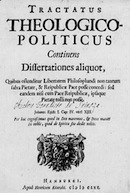
Source: Theologico-Political Treatise - Chapter I. of Prophecy
Spinoza's Chapter 1. - on the word spirit and (Deus sive Natura) has neither body or mind (Page 4)

Spinoza undertakes to explain those passages of Scripture which speak of the Spirit of God. He gives examples of each in quotations from the Bible. His mastery of the Biblical text is evident.
In some places the expression merely means a very strong, dry, and deadly wind... At other times it is used as equivalent to high courage... Any unusual virtue or power is called the Spirit or Virtue of the Lord.
Again, inasmuch as the Bible, in concession to popular ignorance, describes (Deus sive Natura) as having a mind, a heart, emotions - nay, even a body and breath - the expression Spirit of the Lord is used for (Deus sive Natura)'s mind, disposition, emotion, strength, or breath. Lastly, the Spirit of the Lord is used in Scripture to express the emotions of (Deus sive Natura), e.g. His kindness and mercy,
Returning, then, to the main object of our discussion...we find that the imagination of the prophets may equally be called the mind of (Deus sive Natura). On our minds also the mind of (Deus sive Natura) and His eternal thoughts are impressed; but this being the same for all men is less taken into account.
Lastly, the prophets were said to possess the Spirit of God because men knew not the cause of prophetic knowledge, and in their wonder referred it with other marvels directly to the Deity, styling it Divine knowledge.
Comment:
It is ignorance that describes (Deus sive Natura) as having a body or a mind and possessing emotions such as kindness and mercy. Men are also wrong to call prophetic words devine.